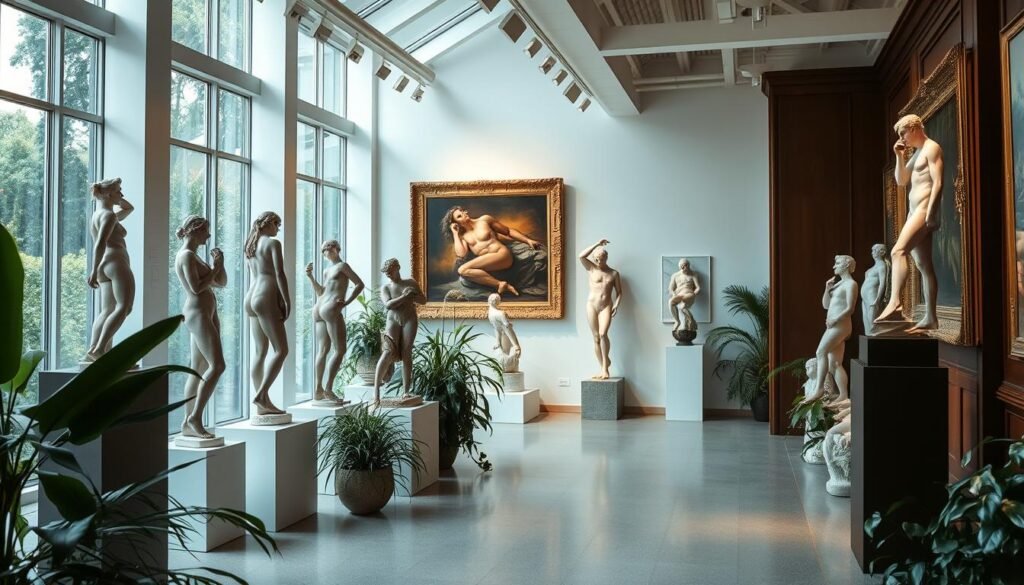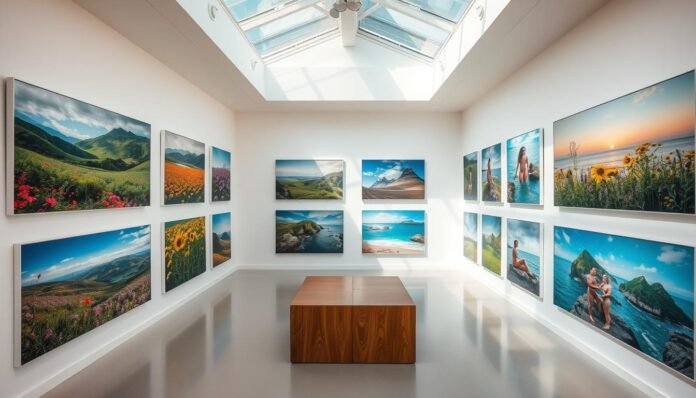The Gallery Nudists movement blends art and freedom through photography. It shows the human body in a natural and genuine way. In this gallery, you can see a wide range of nude photos. They all celebrate human beauty and realness.
There are over 5 million pictures in the Nudists Collection. It includes everything from puzzles to fine art prints. Each photo tells a story of being comfortable and open with oneself.
Pieces like Picture No. 12010775 invite us to see the beauty in being vulnerable. Picture No. 12010774 shows how nudist communities worldwide share a bond. And pictures like No. 12010769 and No. 12010748, highlight joy and the need to connect. This art makes us value special moments without societal pressures.
This gallery is more than just a place to view art. It’s a celebration of accepting our bodies and criticizing old views on nudity. It proves how art focused on naturism can support body positivity and break down barriers.
Key Takeaways
- The Gallery Nudists movement intertwines fine art and nudism.
- 5 million images in the Nudists Collection enrich the nude photography gallery experience.
- Prominent themes include vulnerability, unity, and self-acceptance.
- Nudism is increasingly recognized for promoting body positivity and well-being.
- The movement reflects changing population demographics and societal attitudes toward nudity.
Understanding the Gallery Nudists Concept
The gallery nudists concept supports a positive view of nudism with vibrant pictures. It aims to create places where we celebrate the human body naturally, without society’s usual judgments. It’s about seeing nudism as an art form that’s always changing. These galleries are key for artists and photographers. They delve into themes like human connection, freedom, and being true to oneself in the nudist world.
Looking at images from the nudist community boosts body positivity. Studies show that nudism within families helps everyone feel better about their bodies. Such activities bring families closer, strengthening their relationships. Also, being nude in nature helps people feel more connected to the world. It brings a sense of belonging and calm.
Accessibility and acceptance are big parts of this movement. They help break down social walls and build a culture of equality. The history of nudity in art goes way back to ancient cultures like Greece and Rome. It has changed throughout time, from the Renaissance era with famous artists like Leonardo da Vinci, to modern creators like Jenny Saville and Lucian Freud. Each period shows different views on nudity.

Buying art that features nudity is not just for looks. It’s also about being part of cultural conversations and new artistic ideas. The naturalist gallery becomes a special place. Here, various styles and expressions come together, helping us understand human experiences better through nudism.
| Era | Characteristics | Influential Artists |
|---|---|---|
| Ancient Greece and Rome | Celebration of the human body, idealized forms | Unknown) |
| Renaissance | Revival of classical themes, religious contexts | Leonardo da Vinci, Michelangelo |
| Baroque and Rococo | Voluptuous forms, dynamic compositions | Peter Paul Rubens |
| 19th Century | Shift towards realism, sociopolitical themes | Édouard Manet, Gustave Courbet |
| 20th Century | Revolution in artistic styles, experimentation | Cindy Sherman, Lucian Freud |
History of Nudism in Art
The history of nudism in art goes way back to ancient times. Back then, people celebrated the human body through art, seeing it as a source of beauty, fertility, and deep human experiences. Ancient Greeks were big fans of showing male nudes, especially in sports events tied to religious festivals. They believed these images stood for victory and moral greatness.
The artist Praxiteles made waves around the mid-fourth century B.C. by sculpting a nude Aphrodite. This piece of art really changed the game for how female nudes were seen. It kicked off a new wave in naturist art. The famous Knidian Aphrodite became a model for many later artworks, thanks to its mathematically perfect proportions.
Long before that, even prehistoric art from the Upper Paleolithic to the Metal Age showed female figures. These were seen in cave paintings and as fertility symbols. Over time, art evolved. Ancient Egyptian art often showed people nude in court scenes and everyday life, helped by the hot climate.
In ancient Greece and Rome, art focused on balance and harmony in the human body. By 1485, Botticelli was making waves with a nude female figure that wasn’t tied to religion. Later on, artists like Francisco de Goya and Gustave Courbet broke more rules. They showed nudity in ways that shook up the usual norms and academic expectations.
During the 19th and 20th centuries, art continued to explore the nude form. This time through nude photography galleries that highlighted realness, vulnerability, and identity. Today, this rich history lives on. Modern galleries focused on nudism in art show a wide range of expressions, proving its lasting impact.

Highlighting Influential Nudist Photographers
Remarkable artists have shaped nudist photography over the years. Laurent Baheux, a French photographer, is well-known for his impactful black-and-white images. His work reflects the essence of nature and the freedom of his subjects. It makes his portfolio stand out in any nudism art gallery.
Diane Arbus is recognized for her honest and understanding looks at marginalized groups. Her work shows that a nudist exhibition can be more than just looks. It lets viewers connect on an emotional level. Each photographer adds to the beauty of nude photography with their unique styles and stories.
Sam Haskins is famous for his black-and-white nude photographs. His books with nude models made this style popular among more people. Joyce Tenneson’s work uses a gentle sfumato technique, focusing on the human body’s beauty.
American photographers like Alfred Stieglitz and Ralph Gibson have made significant impacts. Stieglitz helped shape modern art. Artists like Robert Mapplethorpe and Todd Essick offer daring and fresh perspectives with their work. Their contributions have had a lasting effect, showing the importance of their works for over 70 years.
These photographers have helped nudist photography reach a wider audience. Their innovative styles inspire new artists. This ensures that interest in the human form keeps growing in the art world.
For more information on important artists in this field, check out Masters of Nude Photography.
Nudist Lifestyle Photos: Capturing Authentic Moments
Nudist lifestyle photos show true authenticity and human connection. They highlight the vulnerability and strength found in the nudist community. Photographers dive deep into their subjects’ lives to capture these moments. This empathy creates a stronger bond and allows for genuine, touching images. These photos challenge traditional views on beauty and identity.
The Role of Empathy in Nudist Photography
Empathy is key in nudist photography. It lets photographers and subjects connect on a deep level. This connection turns photos into stories of real human experience. By working closely with their subjects, photographers help them show their true selves. This deep relationship is crucial for making meaningful images that touch both creators and viewers.
Case Study: Diane Arbus and Her Unique Perspective
Diane Arbus is a great example of using empathy in photography. Her work, such as “A Young Waitress at a Nudist Camp, NJ,” shows her deep dive into the nudist world. She built a special relationship with her subjects. Her photos encourage us to see beauty and identity in new ways.
Artists like Jocelyn also celebrate the human body through their work. Her book “Sovereign” focuses on older women, showing powerful and sensual images. However, nudist photography faces challenges due to societal views on nudity. By focusing on diverse subjects, artists like Jocelyn challenge these norms. They push the boundaries in the art world.
Exploring the Naturist Gallery Movement
The Naturist Gallery Movement is changing views on nudism with art exhibitions. They highlight the human body’s beauty. Through various nudist exhibition ideas, it starts conversations on body positivity. This helps us all understand and accept our natural selves better.
Artworks in the movement show what nudist galleries believe in. This makes nudist art more seen in our culture. People like Annebella Pollen have shown how nudism and art have been linked for ages. The gallery offers new ways to see nudity and art together.
This movement is built on years of artistic and nudist ideas. It’s changing how we view nudity in art and life. The Naturist Gallery Movement is important for seeing nudity as something normal and good. This helps everyone appreciate our natural bodies more.








